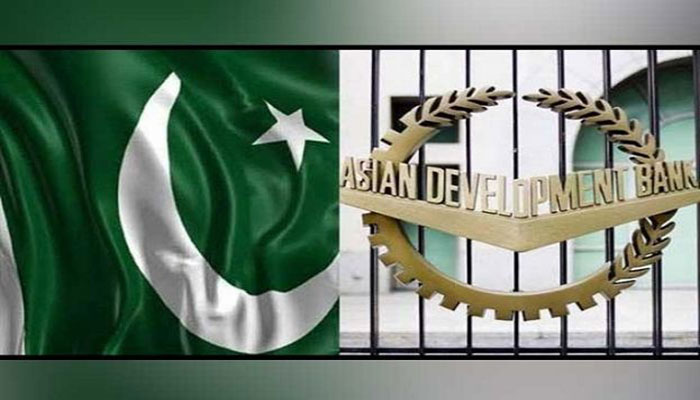ADB approves $300 million policy-based loan for Pakistan
ISLAMABAD: Asian Development Bank (ADB) on Friday approved another $300 million policy-based loan to help Pakistan improve trade competitiveness, asserting the lender’s support to the IMF-backed reforms in the country.
Economic Affairs Division Secretary Noor Ahmed and ADB Country Director Xiaohong Yang signed the loan agreement. Minister for Economic Affairs Khusro Bakhtyar witnessed the signing.
Bakhtyar said the government’s key economic reforms and policies helped stabilising external account despite the unprecedented challenges caused by COVID-19 pandemic.
“Pakistan’s external account stability is underpinned by highest ever remittances, improved balance of trade and official inflows,” he said.
Yang said ADB fully supports the government’s development vision and policies. ADB is providing its support for policy reforms and project financing in the key priority areas such as financial management, energy, road, social sector, water and irrigation and urban services. “The government’s ongoing efforts to ensure stability have started showing encouraging results despite the COVID-19 challenge,” she said.
The authorities convinced the ADB for approving the program loan after having agreed to implement 13 major conditions for securing $300 million loan. The country agreed to reduce corporate tax rates and remove the electricity surcharge of Rs.3.35/kwh on industrial consumers.
ADB said the loan will help promote macroeconomic stability in the country by facilitating improved trade competitiveness and export diversification.
“ADB is coordinating its efforts with other development partners and donors while the program complements International Monetary Fund-led reform initiatives by helping to improve competitiveness, which will help build robust foreign exchange reserves,” ADB said in a statement.
ADB approved almost $2 billion worth of policy-based loans for Pakistan after a gap of one and half years after the IMF agreed to arrange extended fund facility of $6 billion last year to introduce structural reforms in the country that was imperiled by current account deficit. This was the country’s 13th IMF loan since 1980s and one that started following another one that completed successfully in 2016.
Although the IMF program went into a sleeping mode in the wake of COVID-19 pandemic, the government recently hinted at resumption of the program.
Adviser to Prime Minister on Finance Hafeez Shaikh told media last week that the IMF mission would visit within next
few weeks and hoped that the Fund program would soon be revived. Since fiscal year 2004, Pakistan has registered a rise-and-fall pattern of export growth reflecting underperformance in its export industry and long-term decline in export competitiveness. This is compounded by lost export growth momentum from COVID-19, which has reduced high-income countries’ demand for manufacturing goods and disrupted the supply of raw materials.
“While COVID-19 hit Pakistan at a critical point in its macroeconomic recovery, the government’s ongoing efforts to ensure stability have started showing encouraging results this fiscal year,” said ADB Principal Public Management Specialist Hiranya Mukhopadhyay. “ADB’s program will support these efforts and help Pakistan to improve its export competitiveness—now more important than ever given the impacts of the pandemic.”
ADB’s program will help Pakistan recover its current account deficit in a sustained manner and continue to facilitate export diversification.
It will introduce important tariff- and tax-related policy reforms to help improve Pakistan’s international competitiveness and further strengthen key institutions, including accreditation bodies, the Export–Import Bank of Pakistan, and the Pakistan single window.
The new financing falls under subprogram 2 of the trade and competitiveness program. Under the first phase, ADB helped the government usher in key reforms, including reducing or abolishing tariffs and ad hoc duties on a large number of raw materials and intermediate goods. Several steps were also taken to introduce e-commerce, strengthen key institutions involved in facilitating trade, and enhance the export certification process.
-
 King Charles Is ‘clearly Worried’ Andrew Has Tarnished Royal Image
King Charles Is ‘clearly Worried’ Andrew Has Tarnished Royal Image -
 Royal Family Loses 'loyal' Worker After King Charles Disliked His Work?
Royal Family Loses 'loyal' Worker After King Charles Disliked His Work? -
 James Van Der Beek's Quiet Sacrifice Before Death Comes To Light
James Van Der Beek's Quiet Sacrifice Before Death Comes To Light -
 Suspect Kills Six Across Florida Before Taking His Own Life
Suspect Kills Six Across Florida Before Taking His Own Life -
 AI Helps Researchers Identify 2,000-year-old Roman Board Game Stone
AI Helps Researchers Identify 2,000-year-old Roman Board Game Stone -
 Inside Kate Middleton, Prince William’s Nightmare Facing Andrew Mountbatten-Windsor
Inside Kate Middleton, Prince William’s Nightmare Facing Andrew Mountbatten-Windsor -
 Margaret Qualley Shares Heartfelt Confession About Husband Jack Antonoff: 'My Person'
Margaret Qualley Shares Heartfelt Confession About Husband Jack Antonoff: 'My Person' -
 Savannah Guthrie Shares Sweet Childhood Video With Missing Mom Nancy: Watch
Savannah Guthrie Shares Sweet Childhood Video With Missing Mom Nancy: Watch -
 Over $1.5 Million Raised To Support Van Der Beek's Family
Over $1.5 Million Raised To Support Van Der Beek's Family -
 Paul Anthony Kelly Opens Up On 'nervousness' Of Playing JFK Jr.
Paul Anthony Kelly Opens Up On 'nervousness' Of Playing JFK Jr. -
 Diana Once Used Salad Dressing As A Weapon Against Charles: Inside Their Fight From A Staffers Eyes
Diana Once Used Salad Dressing As A Weapon Against Charles: Inside Their Fight From A Staffers Eyes -
 Video Of Brad Pitt, Tom Cruise 'fighting' Over Epstein Shocks Hollywood Fans
Video Of Brad Pitt, Tom Cruise 'fighting' Over Epstein Shocks Hollywood Fans -
 Jelly Roll's Wife Bunnie Xo Talks About His Huge Weight Loss
Jelly Roll's Wife Bunnie Xo Talks About His Huge Weight Loss -
 Margot Robbie Reveals Why She Clicked So Fast With Jacob Elordi
Margot Robbie Reveals Why She Clicked So Fast With Jacob Elordi -
 Piers Morgan Praised By Ukrainian President Over 'principled Stance' On Winter Olympics Controversy
Piers Morgan Praised By Ukrainian President Over 'principled Stance' On Winter Olympics Controversy -
 Halsey's Fiance Avan Jogia Shares Rare Update On Wedding Planning
Halsey's Fiance Avan Jogia Shares Rare Update On Wedding Planning




